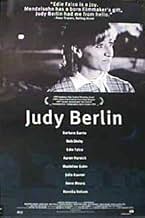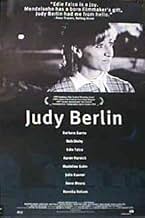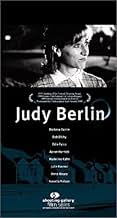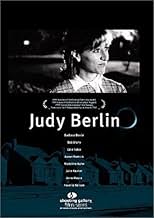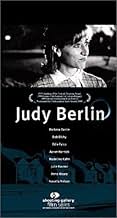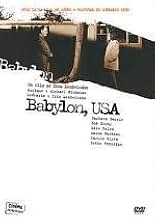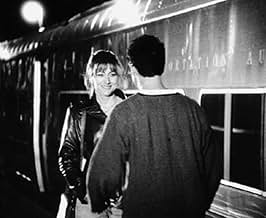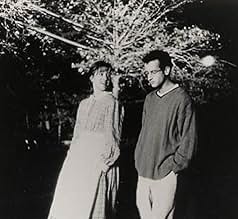IMDb RATING
6.9/10
1.1K
YOUR RATING
A lonely, talented teacher enjoys a flirtation with the (married) principal of the school, who returns her affections but is hampered by his family members. An eclipse enables the teacher an... Read allA lonely, talented teacher enjoys a flirtation with the (married) principal of the school, who returns her affections but is hampered by his family members. An eclipse enables the teacher and principal to steal several more fleeting moments.A lonely, talented teacher enjoys a flirtation with the (married) principal of the school, who returns her affections but is hampered by his family members. An eclipse enables the teacher and principal to steal several more fleeting moments.
- Awards
- 4 wins & 15 nominations total
- Director
- Writer
- All cast & crew
- Production, box office & more at IMDbPro
Featured reviews
In a day of eclipse in Babylon Village, in New York, the thirty-two year-old aspirant actress Judy Berlin (Edie Falco) is moving to California expecting to make her dream come true. Her mother Suzan 'Sue' Berlin (Barbara Barrie) is a bitter school teacher that likes to flirt with the principal Arthur Gold (Bob Dishy), who is married with the housewife Alice Gold (Madeline Kahn) that is close to a breakdown. Their thirty year-old son David Gold (Aaron Harnick) has just moved back home after a frustrating experience as filmmaker. While wandering on the street, David meets Judy who studied with him in the elementary school and they spend the day together. Meanwhile the confused Arthur kisses Sue during the eclipse.
"Judy Berlin" is a delightful low-budget movie with entwined stories in the suburb of Babylon. The performances are excellent, disclosing the intimacy of the characters in a realistic way. This movie was released in Brazil on VHS by Cult Films Distributor. My vote is eight.
Title (Brazil): "Judy Berlin"
"Judy Berlin" is a delightful low-budget movie with entwined stories in the suburb of Babylon. The performances are excellent, disclosing the intimacy of the characters in a realistic way. This movie was released in Brazil on VHS by Cult Films Distributor. My vote is eight.
Title (Brazil): "Judy Berlin"
Finding amusement in the thin, flat tract of routinized suburbia called Long Island is easy. Finding poetry in that glacial deposit of post-World War 2 optimism just a few miles from Manhattan is where storytellers usually stumble. The less visionary settle for rue or bitter satire. The more clear sighted (like first time feature director Eric Mendelsohn) in his haunting and hopeful "Judy Berlin" sustain a reverence for such dappled things as the fuzzy cry of Long Island Railroad whistles, the hushed moments when streetlights snap of at dawn, and the hum of the vacuum cleaners as black housekeepers tidy the living rooms of their white employers. When I first saw this drama at Sundance a year ago, I liked it. On second viewing, I think I love it. "Judy Berlin" is about fuzzy, hushed, humming moments of possibility experienced by an interrelated assortment of Long Islanders on an early autumn day when an eclipse upsets ordinary routine. It's also more specifically, about a sunny woman and a moony man who cross paths just as magically. In Mendelsohn' astronomy, 30ish Judy herself ("The Soprano's" Edie Falco) represents the Island at its most resilient. Friend to everyone in her hometown, she's a former tough girl and current aspiring actress with a mouthful of braces and no particular talent except for enthusiasm. And on this day she's saying her goodbyes before she tries her luck in Los Angeles. Judy's former high school classmate David Gold (Aaron Harnick) is a walking amalgam of everything arrested, depressed and stultified from that same address - the lost boy who never grow up. An aspiring film-maker, he went to L.A. only to return home, defeated, to his parents. Judy bubbles; David despairs, in Woody Allenish cadences. (Mendelsohn used to work as an assistant to Allen's costumer.) Yin and yang, light and dark, night and day. The film-maker balances the two with gyroscopic poise, while those around them weigh their own options for transformation. Holding the mother together as much as the sweetness of the performances is cinematographer Jeffrey Seckendorf's velvety black and white photography, which lavished the same admiration on knick-knackery in the Gold's living room as it does on trees swaying from the flapping wings of birds feeling the approaching eclipse. But "Judy Berlin's" sustained loveliness and the graciousness with which Mendelsohn acknowledges what's precious and what's paralyzing about the place he comes from - well, that is the film-maker's own gift from the suburbs.
This is the neglected gem of last year, and in my estimation the best film of the year.
Think of it as a middle-class Ice Storm, but while the upper-class suburbanites of Ice Storm were too distant and unreal to care about, the middle-class lives depicted in Judy Berlin are very real and both heart-breakingly sad and genuinely funny (without caricature or directorial mocking). I've often heard the phrase laughing through tears, but never experienced it until seeing this film.
The performances are without exception incisive and dead-on. Of particular note: the counterpoint of Aaron Harnick's sad, lost David and the open-faced lifeforce that is Edie Falco's Judy; Barbara Barrie's portrait of a loving schoolteacher -- with an edge; Bob Dishy's sullen and conflicted Arthur, among the most subtle work in this usually comic actor's long career; and Madelyn Kahn in her final film role, touching and hilarious (as always) as a housewife on the verge of a nervous breakdown. Her scene when she encounters her psychiatrist while aimlessly wandering the streets during the eclipse, and manages to offer him words of comfort, is the film's defining moment -- a film of beautifully etched characters behaving in very real yet very surprising ways in moments of conflict filled with shades of gray.
Speaking of which, the film is shot brilliantly in black and white to point up both the beauty and the horror of this suburban landscape.
However did this film languish on a shelf for two years? If film scripts were eligible for Pulitzer Prizes, Eric Mendelsohn's would have surely been a contender.
Think of it as a middle-class Ice Storm, but while the upper-class suburbanites of Ice Storm were too distant and unreal to care about, the middle-class lives depicted in Judy Berlin are very real and both heart-breakingly sad and genuinely funny (without caricature or directorial mocking). I've often heard the phrase laughing through tears, but never experienced it until seeing this film.
The performances are without exception incisive and dead-on. Of particular note: the counterpoint of Aaron Harnick's sad, lost David and the open-faced lifeforce that is Edie Falco's Judy; Barbara Barrie's portrait of a loving schoolteacher -- with an edge; Bob Dishy's sullen and conflicted Arthur, among the most subtle work in this usually comic actor's long career; and Madelyn Kahn in her final film role, touching and hilarious (as always) as a housewife on the verge of a nervous breakdown. Her scene when she encounters her psychiatrist while aimlessly wandering the streets during the eclipse, and manages to offer him words of comfort, is the film's defining moment -- a film of beautifully etched characters behaving in very real yet very surprising ways in moments of conflict filled with shades of gray.
Speaking of which, the film is shot brilliantly in black and white to point up both the beauty and the horror of this suburban landscape.
However did this film languish on a shelf for two years? If film scripts were eligible for Pulitzer Prizes, Eric Mendelsohn's would have surely been a contender.
This film has a quiet beauty and some very wonderful performances. However, the poetry of the movie is too disjointed for my personal taste. I understand the ideas the director is going for, but I felt the movie lacked enough charm to pull it off. The dialogue has moments of reality, yet often tries too hard for truth, missing the mark. This is a very artistic effort, not meant for the average movie-goer. With a bit more practice and polish, the director could one day be quite great. He needs to stop imitating others and find his own voice.
I was torn between admiring it's gentility and screaming to have the monotony end! That is real life, isn't it? Sometimes moments last too long and others pass too quickly.
It is a film for film lovers, yet needs a tighter reining by the editor/director.
I was torn between admiring it's gentility and screaming to have the monotony end! That is real life, isn't it? Sometimes moments last too long and others pass too quickly.
It is a film for film lovers, yet needs a tighter reining by the editor/director.
Remember when art films weren't directed by teenagers for teenagers? Remember when they didn't have anything to do with pop culture. Remember when there was actually something as an adult culture?
Neither do I. But there must be some old people out there who do.
"Independent films", a new genre that has replaced what used to be called "art films", are not worthy of their name. They're, on the whole, hip, mass-marketed screwball comedies, "chick flicks", novelty films, etc. Little other than budget separates an "independent film" from a slick, cynical Hollywood marketing effort. In fact, many independent films are slick, cynical Hollywood marketing efforts.
Seeing Judy Berlin is what it used to be like seeing art films. The very fact that nothing in it is designed to shock or surprise you will shock and surprise you. The very fact that nothing in it was test-screened for maximal emotional manipulation will maximally emotionally manipulate you. The fact that no surprising plot twists were inserted to make you want to go see it again will so surprise you that you will want to see it again.
This is not necessarily an endorsement. But I want to stress that this is a film that will not remind you of any other film. It will not be die hard on an anything. It doesn't count Gilligan's Island and My Favorite Martian among its influences, but Checkhov, Camus and Bergman--the sorts of things you've been taught to think are pretentious and stodgy. It is something new--even dare I say it, experimental. Gasp! Avant garde. It wasn't made to make the most money possible. There will be no toy tie-in available with your happy meal.
Whatever you think of this film, cherish it as a kind of throwback, a one-in-a-million, the last dodo bird yet living.
Neither do I. But there must be some old people out there who do.
"Independent films", a new genre that has replaced what used to be called "art films", are not worthy of their name. They're, on the whole, hip, mass-marketed screwball comedies, "chick flicks", novelty films, etc. Little other than budget separates an "independent film" from a slick, cynical Hollywood marketing effort. In fact, many independent films are slick, cynical Hollywood marketing efforts.
Seeing Judy Berlin is what it used to be like seeing art films. The very fact that nothing in it is designed to shock or surprise you will shock and surprise you. The very fact that nothing in it was test-screened for maximal emotional manipulation will maximally emotionally manipulate you. The fact that no surprising plot twists were inserted to make you want to go see it again will so surprise you that you will want to see it again.
This is not necessarily an endorsement. But I want to stress that this is a film that will not remind you of any other film. It will not be die hard on an anything. It doesn't count Gilligan's Island and My Favorite Martian among its influences, but Checkhov, Camus and Bergman--the sorts of things you've been taught to think are pretentious and stodgy. It is something new--even dare I say it, experimental. Gasp! Avant garde. It wasn't made to make the most money possible. There will be no toy tie-in available with your happy meal.
Whatever you think of this film, cherish it as a kind of throwback, a one-in-a-million, the last dodo bird yet living.
Did you know
- TriviaMadeline Kahn's final feature film.
- GoofsThe film takes place while a solar eclipse is in progress. The sky goes so dark that the streetlights come on. Much of the story continues through this "dark time". A real eclipse has this totality and darkness for about two minutes, tops! The total eclipse in "Judy Berlin" just goes on way too long.
- Quotes
Alice Gold: I wanted children and I gave birth to a viper.
- SoundtracksSerenade No. 10 in B-flat
Composed by Wolfgang Amadeus Mozart
Performed by The New York Philharmonic Chamber Ensemble
Details
- Release date
- Country of origin
- Official site
- Language
- Also known as
- Judy Berlin
- Filming locations
- Production companies
- See more company credits at IMDbPro
Box office
- Gross US & Canada
- $61,236
- Opening weekend US & Canada
- $61,236
- Feb 27, 2000
- Gross worldwide
- $61,236
- Runtime
- 1h 33m(93 min)
- Color
- Sound mix
- Aspect ratio
- 1.85 : 1
Contribute to this page
Suggest an edit or add missing content

